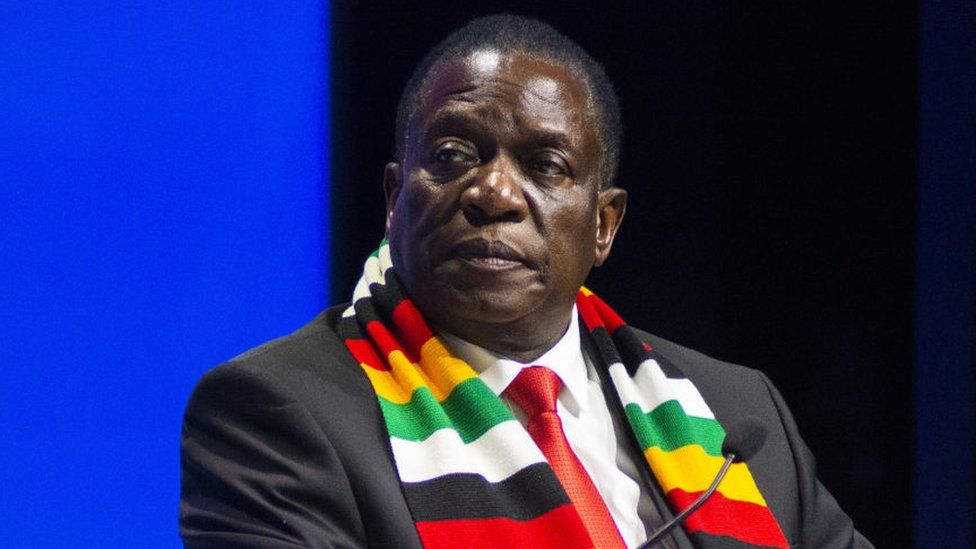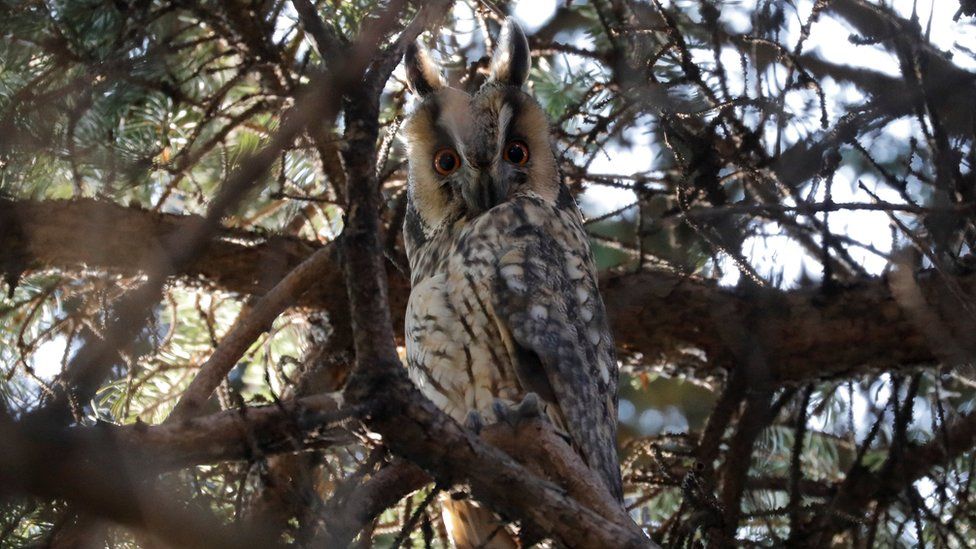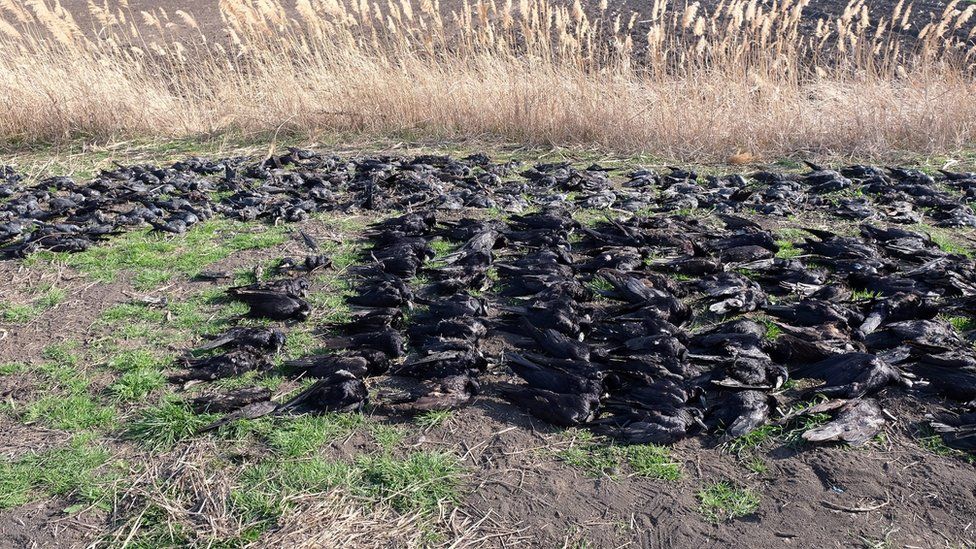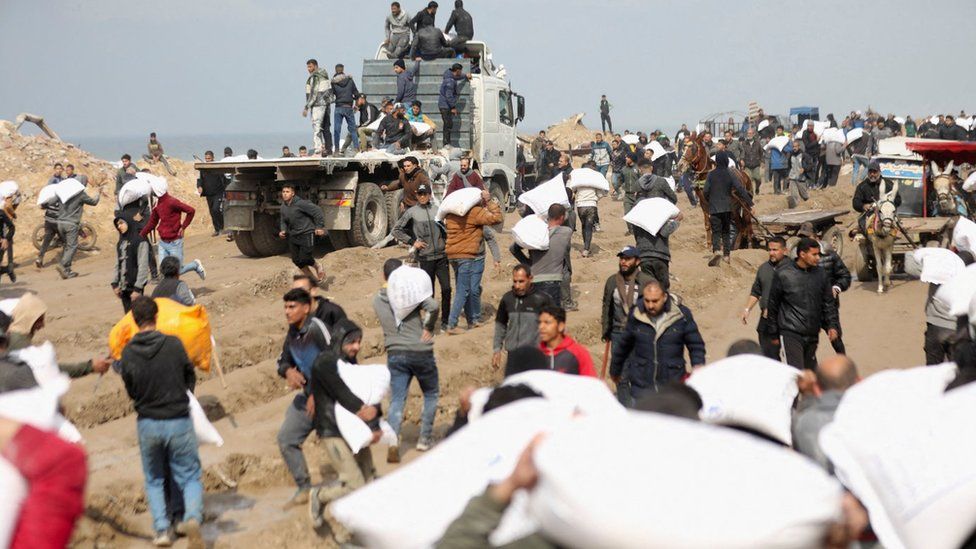Zimbabwe: US slaps fresh sanctions on President Mnangagwa and other leaders
 IMAGE SOURCE,
IMAGE SOURCE,
GETTY IMAGES
Image caption,
Emmerson Mnangagwa was sworn in as Zimbabwe's leader for a second term in 2023
By Kathryn Armstrong
BBC News
The US has imposed sanctions on Zimbabwe's President Emmerson Mnangagwa for corruption and human rights abuses.
The order also affects other senior leaders in the country - blocking their assets in the US and barring them from unofficial travel there.
The new sanctions replace a broader programme that was introduced two decades ago.
"We continue to witness gross abuses of political, economic, and human rights," the White House said in a statement.
"The targeting of civil society and severe restrictions on political activity have stifled fundamental freedoms, while key actors, including government leaders, have siphoned off public resources for personal gains," it added.
"These illicit activities support and contribute to a global criminal network of bribery, smuggling, and money laundering that impoverish communities in Zimbabwe, southern Africa, and other parts of the world."
The US Secretary of State, Antony Blinken, meanwhile cited "multiple cases of abductions, physical abuse, and unlawful killing" in Zimbabwe that had left people "living in fear".
The White House said it was "refocusing and elevating its efforts to hold accountable the individuals and entities that are responsible for this exploitation".
As well as Mr Mnangagwa, the US also sanctioned 10 other people and three businesses.
Those on the list include First Lady Auxillia Mnangagwa, Vice President Constantino Chiwenga and Defence Minister Oppah Muchinguri.
Various other senior security officials, including members of Zimbabwe's national police and Central Intelligence Organisation (CIO), are also targeted - as are businesspeople found to have facilitated state corruption.
They include presidential advisor Kudakwashe Tagwirei, his wife and two of their businesses.
All other people that were previously sanctioned by the US and are not on the new list have had their restrictions lifted.
A spokesman for the Zimbabwean government, Nick Mnangagwa, described the lifting of the old sanctions programme as a "great vindication of President Mnangagwa's Foreign Policy" and called the new tariffs "illegal".
Farai Muroiwa Marapira, a spokesman for Mr Mnangagwa's ruling Zanu PF party said the president's "policy of being a friend to all and an enemy to none and having our doors open to all has yielded bittersweet results".
"If the president, the first lady and senior officials remain sanctioned then Zimbabwe remains sanctioned and burdened by this illegality," he wrote on X, formerly Twitter.
The US first imposed economic and travel sanctions on Zimbabwe in the early 2000s - targeting then president Robert Mugabe and dozens of other high-ranking government officials, whom Washington accused of undermining democracy in the country.
Various countries including the UK and European Union members have also placed sanctions on Zimbabwe.
President Mnangagwa, who was sworn in for a second term as the country's last year, has in the past blamed the economic tariffs for crippling development in the country.
Related Topics
Serbia bird deaths: Suspected poisonings threaten much-loved owls

Thousands of birdwatchers in Serbia and from abroad regularly travel to Kikinda to see the long-eared owls in the town's parks
By Guy De Launey
BBC News, Belgrade
Bird watchers call Kikinda, in northeast Serbia, the "world capital of long-eared owls".
As many as 700 of these striking birds of prey - which get their name from their distinctive ear tufts - spend the winter months roosting in the trees around the main square of this small Serbian town close to the border with Romania.
But local ornithologists are warning that the much-cherished owl population may be under threat, after they discovered more than 800 dead birds in nearby fields in recent days. Experts believe they could have been poisoned.
None of the dead birds were long-eared owls. They are mostly rooks and jackdaws, which are locally-protected species. But they are crucial to the local ecosystem and to the long-eared owls, which are also protected.
"The rooks build nests," says Marko Sciban, who works for the LIFE Danube Free Sky Project. "When they leave them in May, they are used by owls, red-footed falcons and kestrels."
The birds of prey do not build their own nests, so if there is nowhere for them to roost, they may move away from Kikinda.
And that would potentially be devastating for nearby famers who - consciously or otherwise - rely on them for pest control.
According to some estimates, the owls scoff as many as half a million voles and mice over the five months of winter. That service is particularly crucial in the current season.
"Last year and this year, farmers in northern Serbia have been suffering from an invasion of millions of rodents," says Milan Ruzic, the executive director of the Bird Protection and Study Society of Serbia.
"There are simply not enough animals to prey on the rodents. If we have less wildlife, we have more trouble with the rodents."
Mr Ruzic and his organisation have been trying to encourage farmers and local authorities to cultivate the trees and hedgerows, as they provide a habitat for the species which prey on rodents.
However, instead of following that advice, he believes that frustration with crop damage has led someone to spread poisoned seeds as a form of pest control.
Now, it seems the poison wasn't consumed by rodents - but by rooks and crows. IMAGE SOURCE,
IMAGE SOURCE,
SOCIETY FOR THE PROTECTION AND STUDY OF BIRDS OF S
Image caption,
"We could see the birds dying right in front of our eyes," said Mr Ruzic, the executive director of the Bird Protection and Study Society of Serbia
"We could actually see the birds dying right in front of our eyes," says Mr Ruzic.
"They were up in the trees, behaving really strangely, and then just falling down. The damage is huge," he adds.
After the ornithologists raised the alert, the authorities were quickly on site. Veterinary officials took away the dead birds and are analysing them to assess whether this is indeed a case of poisoning and, if so, what kind.
Milan Ruzic - a qualified vet himself - is, however, already convinced that this is the latest in what he calls a "long-running series of illegal poisonings".
He is concerned about the impact it will have on Kikinda, which enjoys an annual influx of tourists keen to feast their eyes on the world's largest roost of long-eared owls.
"The whole city in winter and autumn relies on this spectacle. It brings a huge amount of money to the town, in terms of visitors, people staying over, visiting restaurants, buying souvenirs. It brings profit to the local community."
"We're trying to communicate to people that it's not only about this one case, we need to make sure this never happens again. Not only to the crows, but to any other species," Mr Ruzic says. "Because it does affect your lives."
Related Topics
Gaza aid airdrop: Why delivering food from the air is controversial
Watch: US cargo plane airdrops humanitarian aid into Gaza
By Luis Barrucho, BBC World Service, and BBC Arabic
BBC
The US says it airdropped 36,000 meals into northern Gaza on Tuesday in co-ordination with Jordan - the second such joint mission in recent days.
It came a day after the World Health Organization said children were dying of starvation in the north, where an estimated 300,000 Palestinians are living with little food or clean water.
But the strategy has sparked considerable discussion, with humanitarian organisations saying it cannot meet the soaring needs.
It is also a symbol of the failure of the aid effort on the ground.
Aid lorries have been entering the south of Gaza through the Egyptian-controlled Rafah crossing and the Israeli-controlled Kerem Shalom crossing during the war between Israel and Hamas. But the north, which was the focus of the first phase of the Israeli ground offensive, has been largely cut off from assistance in recent months.
On 20 February, the World Food Programme (WFP) said it was suspending food deliveries to northern Gaza because its first aid convoys in three weeks had endured "complete chaos and violence due to the collapse of civil order", including violent looting.
Last Thursday, more than 100 Palestinians were killed as crowds rushed to reach an aid convoy operated by private contractors that was being escorted by Israeli forces west of Gaza City.
Palestinian health officials said dozens were killed when Israeli forces opened fire. Israel's military said most died from either being trampled on or run over by the aid lorries. It said soldiers near the aid convoy had fired towards people who approached them and who they considered a threat.
But on Tuesday the WFP said it attempted to reach northern Gaza with food supplies today, but was "turned back" by the Israel Defense Forces (IDF). The IDF are yet to comment.
Israel's military launched an air and ground campaign in Gaza after Hamas's attacks on Israel on 7 October, in which around 1,200 people were killed and 253 others were taken hostage. More than 30,000 people have been killed in Gaza since then, the territory's Hamas-run health ministry says.
'Not enough'
More than 20 airdrops of aid into Gaza have taken place over the past few weeks in co-ordination with the Israeli military, with France, the United Arab Emirates and Egypt conducting them alongside the US and Jordan.
One Gaza resident, Ismail Mokbel, told BBC Arabic's Gaza Lifeline radio - an emergency radio service for the territory set up in response to the conflict - that packages of aid dropped on Friday consisted of some legumes and a few women's health essentials.
Desperate Palestinians have been surrounding convoys of lorries bringing food aid into northern Gaza
Another man, Abu Youssef, said he was not able to get some aid that was dropped near al-Shifa Hospital in Gaza City.
"Suddenly, when we were looking up into the sky, we saw aid parachutes. So we remained in the place [where we were] until the aid landed about 500 metres away from us. There were many people, but the aid was little, and so we could not get anything."
Mr Mokbel said not enough aid was dropped to meet the basic needs of the large number of people in the area.
"Thousands of citizens saw the aid falling on them... And when hundreds or thousands wait in such areas, only around 10 to 20 people get things, while the others go back with nothing. Unfortunately, this method of dropping through air is not the most suitable way to transport aid to the north district of Gaza," he added.
"Gaza needs a land and water pathway to deliver the aid instead of [doing it in] such a manner, which doesn't meet the needs of all citizens."
'Expensive and haphazard'
Initially employed during World War Two to supply isolated troops on the ground, airdrops have evolved into a valuable tool for delivering humanitarian aid, with the UN first using them in 1973.
However, they are considered a "last resort", only to be used "when more effective options fail", as the WFP said in a 2021 report. South Sudan is the last place where the WFP carried out airdrops.
"Airdrops are expensive, haphazard and usually lead to the wrong people getting the aid," Jan Egeland, the secretary general of the Norwegian Refugee Council and a former UN aid chief, told the BBC after returning from a recent three-day visit to Gaza.
Airdrops are seven times more expensive compared to ground-delivered aid due to costs related to aircraft, fuel and personnel, says the WFP.
In addition to that, only relatively small quantities can be delivered with each flight, in comparison to what a convoy of lorries can bring in, and significant ground co-ordination is required within the delivery zone, says the WFP.
Media caption,
Watch: US parachutes humanitarian aid into Gaza
The International Committee of the Red Cross also stresses the importance of controlling distribution to prevent people from risking their lives by consuming inappropriate or unsafe items.
"Delivering sudden and unsupervised types of food to people who are malnourished or even starving can pose serious risks to life. These risks need to be weighed against delivering nothing by air, or the delay a ground distribution may incur," the organisation warned in a 2016 report published when aid was being airdropped into Syria during the country's civil war.
Airdrops can be carried out from different altitudes, ranging from about 300m to 5,600m (985-18,370ft) in conflict zones, and so ensuring robust packaging is crucial to make sure parcels can endure impact with the ground, the WFP adds.
According to the agency, drop zones should ideally be large, open areas no smaller than a football field, which is why deliveries have often been aimed at Gaza's coastline.
However, this has sometimes resulted in aid falling into the sea or being carried by the wind into Israel, according to local accounts.
'US should pressure Israel'
Gaza resident Samir Abo Sabha told BBC Arabic's Gaza Lifeline radio that he believed the US should do more and put pressure on its ally Israel for a ceasefire.
"As a citizen of Gaza, this stuff is of no use," he said. "What we want [is] America to pressure Israel into a ceasefire and to stop giving Israel weapons and missiles."
Some aid workers have echoed this sentiment.
Last week, Scott Paul of Oxfam America wrote on X, formerly Twitter: "Instead of indiscriminate airdrops in Gaza, the US should cut the flow of weapons to Israel that are used in indiscriminate attacks, push for an immediate ceasefire and the release of hostages, and insist that Israel uphold its duty to provide humanitarian aid, access, and other basic services."
Melanie Ward of Medical Aid for Palestinians said the US, UK and others should "ensure that Israel immediately opens all crossings into Gaza for aid and aid workers to assist those in need".
But as the crisis deepens, others argued that food must be delivered by any means necessary.
"We need to bring food into Gaza any way we can. We should be bringing it by the sea," José Andrés, a chef and founder of World Central Kitchen, which has been sending food to Gaza, told ABC News.
"I don't think we need to be criticising that Jordan, America are doing airdrops. If anything, we should be applauding any initiative that brings food into Gaza."
President Biden has vowed that the US will "redouble our efforts to open a maritime corridor, and expand deliveries by land" - but those efforts have not yet translated into reality on the ground.
Israel Defense Forces spokesman Rear Admiral Daniel Hagari said on Sunday that they were facilitating aid convoys and airdrops to northern Gaza "because we want humanitarian aid to reach Gazan civilians in need".
"We will continue expanding our humanitarian efforts to the civilian population in Gaza while we fulfil our goals of freeing our hostages from Hamas and freeing Gaza from Hamas," he added.
Edited by Alexandra Fouché


























